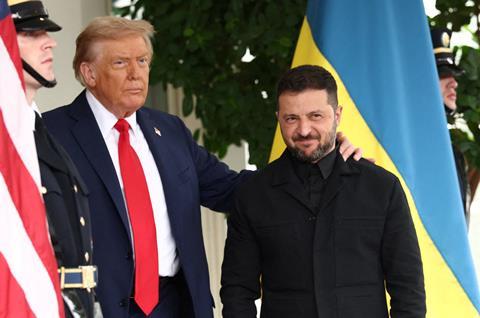From war in Ukraine to asylum hotels in Essex, when it comes to international conflict or local politics, the Christian call to peace remains says George Pitcher. But what exactly does that look like?

Speak it softly, but peace might be breaking out. Given the volatility of the warmongering factions involved, anything could happen over the coming days – even hours – but olive branches are being extended to Israel from Gaza and its sympathisers, and a Ukrainian dove may be building her nest in the walls of the Kremlin.
Christians who still indulge pagan superstitions might have their fingers crossed (invoking the power of the holy cross) or be touching wood (ditto). Prayers this coming weekend must be for the hearts and minds of those who have the directorial power to bring the curtain down on these theatres of war and for the latter-day massacres of the innocents to end.
It might be easier to define what peace doesn’t look like, if we look around us right now
If that comes to pass, we could tentatively step into a September of silenced weaponry. Everything hangs now on the wills of the principal belligerents to these conflicts: Vladimir Putin in Moscow and Benjamin Netanyahu in Jerusalem and the political players behind them that they must satisfy.
In both arenas, the principal brokerage role belongs to the US and its Western European allies, from whom positive political pressure, long called for by agents of peace, has at last been applied. Better late than never, we might murmur with a sigh.
Mixed motives and mysterious ways
Motives could be driven by an American president indulging himself in a kind of peace boosterism, a renewed Pax Americana, with an eye to joining his fellow countryman, Bob Dylan, with whom he must have so much in common, in being awarded a Nobel prize. Again, we might whisper that whatever it takes is more than OK with us and, more vitally, with those who suffer and die in war. Gongs and prizes are the instruments by which mysterious ways make for peace.
And it’s those mysterious ways that attract our prayerful attention, the focus of which must be to wonder what is this peace that the world and its (good) leaders desire and cherish so much. It’s an end to suffering and killing, for sure. But what are the defining characteristics of peace? What, in short, is peace like?
We might reply to that question with whatever cultural version of the golden rule to which we subscribe: Most recognisable to readers of this, I imagine, would be the injunction to love our neighbours as ourselves. In so doing, we cannot help but live in peace with them; the action can cause only that result.
The look of love
That’s necessarily a partial answer to the question above, though, because it doesn’t tell us what it looks like. It might be easier to define what it doesn’t look like, if we look around us right now. We might contend that it doesn’t look like is a UK High Court ruling that a hotel in Essex can’t be used as a hostel for asylum seekers.
The judicial reasoning for this appears to be that the Bell Hotel in Epping was breaching planning rules by not being used for its intended purposes. But, more tellingly for our purposes, the ruling also said that the Bell’s closure was necessary for “restoring the safety of nearby residents” and to remove “the catalyst for violent protests in public places.” It follows an alleged sexual assault by an asylum seeker and consequent populist demonstrations outside the hotel.
What’s remarkable here is that the court seems to invite further violent protests in public places. It encourages a race to the moral bottom of British politics, with Reform UK leader Nigel Farage and Conservative MP Robert Jenrick using the verdict to encourage demonstrations outside many other hotels sheltering asylum seekers.
Perfect peace
The government has committed to ending the use of hotels to house asylum seekers by 2029 – and has already nearly halved the number so used over the past year. In that context, the Epping ruling looks like breaching the peace that it claims to uphold.
We could tentatively step into a September of silenced weaponry
Writing in The Times this week, Danny Finkelstein said: “We need to choose stability and peace over fear and resentment.” Lord Finkelstein is a Jew, and I am not. But what we share culturally (and possibly religiously - I don’t know, I haven’t asked him) is the Law in the Judaic sense – to “love your neighbour as yourself” (Leviticus 19:18). For me, that injunction arises in the faith of his forebears and is fulfilled in the faith of mine.
What we also share is the principle that it applies on the world as well as the domestic stage. It is by its nature self-sacrificial, because it subordinates our own best interests (take note Farage and Jenrick) to those of others, for the purposes of living collectively in peace.
Our shared texts tell us that, ultimately, it’s a peace that “transcends all understanding” (Philippians 4:7). But, in our ignorance, we’re entitled to note that it’s also the triumph of love.






































No comments yet